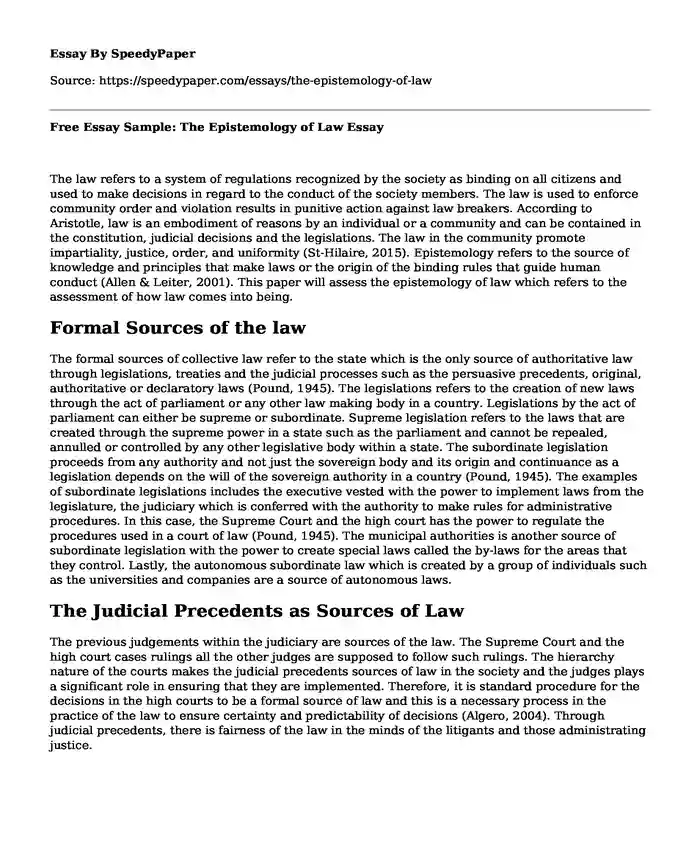The law refers to a system of regulations recognized by the society as binding on all citizens and used to make decisions in regard to the conduct of the society members. The law is used to enforce community order and violation results in punitive action against law breakers. According to Aristotle, law is an embodiment of reasons by an individual or a community and can be contained in the constitution, judicial decisions and the legislations. The law in the community promote impartiality, justice, order, and uniformity (St-Hilaire, 2015). Epistemology refers to the source of knowledge and principles that make laws or the origin of the binding rules that guide human conduct (Allen & Leiter, 2001). This paper will assess the epistemology of law which refers to the assessment of how law comes into being.
Formal Sources of the law
The formal sources of collective law refer to the state which is the only source of authoritative law through legislations, treaties and the judicial processes such as the persuasive precedents, original, authoritative or declaratory laws (Pound, 1945). The legislations refers to the creation of new laws through the act of parliament or any other law making body in a country. Legislations by the act of parliament can either be supreme or subordinate. Supreme legislation refers to the laws that are created through the supreme power in a state such as the parliament and cannot be repealed, annulled or controlled by any other legislative body within a state. The subordinate legislation proceeds from any authority and not just the sovereign body and its origin and continuance as a legislation depends on the will of the sovereign authority in a country (Pound, 1945). The examples of subordinate legislations includes the executive vested with the power to implement laws from the legislature, the judiciary which is conferred with the authority to make rules for administrative procedures. In this case, the Supreme Court and the high court has the power to regulate the procedures used in a court of law (Pound, 1945). The municipal authorities is another source of subordinate legislation with the power to create special laws called the by-laws for the areas that they control. Lastly, the autonomous subordinate law which is created by a group of individuals such as the universities and companies are a source of autonomous laws.
The Judicial Precedents as Sources of Law
The previous judgements within the judiciary are sources of the law. The Supreme Court and the high court cases rulings all the other judges are supposed to follow such rulings. The hierarchy nature of the courts makes the judicial precedents sources of law in the society and the judges plays a significant role in ensuring that they are implemented. Therefore, it is standard procedure for the decisions in the high courts to be a formal source of law and this is a necessary process in the practice of the law to ensure certainty and predictability of decisions (Algero, 2004). Through judicial precedents, there is fairness of the law in the minds of the litigants and those administrating justice.
Legal Sources and the Historical Sources of the Law
The legal sources of law refer to the authoritative embodiments of the law such as the constitution, the executive orders, the statutes, ordinances, charters, by laws and the judicial precedents mentioned earlier. On the other hand, the historical sources of the law are persuasive and lacks formal recognition of the law because they lack authority although they influence the development of legal procedures (Algero, 2004).
References
Algero, M. G. (2004). The Sources of Law and the Value of Precedent: A Comparative and Empirical Study of a Civil Law State in a Common Law Nation. La. L. Rev., 65, 775.
Allen, R. J., & Leiter, B. (2001). Naturalized epistemology and the law of evidence. Virginia Law Review, 1491-1550.
Pound, R. (1945). Sources and Forms of Law. Notre Dame Law., 21, 247.
St-Hilaire, M. (2015). Global Standards of Constitutional Law: Epistemology and Methodology. Retrieved from https://savoirs.usherbrooke.ca/bitstream/handle/11143/6913/Global_Standards_Con_Law.pdf;sequence=1
Cite this page
Free Essay Sample: The Epistemology of Law. (2022, Nov 07). Retrieved from https://speedypaper.net/essays/the-epistemology-of-law
Request Removal
If you are the original author of this essay and no longer wish to have it published on the SpeedyPaper website, please click below to request its removal:
- Entrepreneurial Profile Assessment: Free Essay
- Chemistry Essay Example on Foundation Makeup
- The DMCA and Digital Technology, Essay Example
- Free Essay on Thermal Decomposition of Ammonium Dichromate (Chemical Volcano Experiment)
- Tried by War: Abraham Lincoln as Commander in Chief. Free Essay for Students
- Free Essay Discussing the Role of Performance Evaluation in a Project Environment
- Essay Example on Supplemental Security Income Programme
Popular categories





